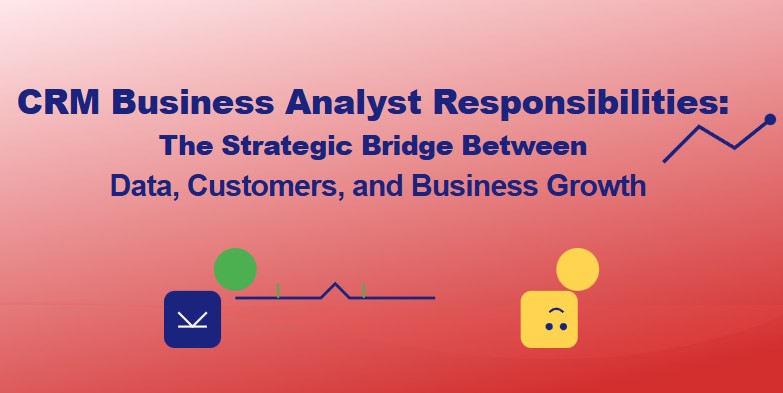In the modern enterprise, data is currency and relationships are capital. Enter the CRM Business Analyst — the mastermind who translates customer data into strategic business decisions. While CRM platforms like Salesforce, HubSpot, or Microsoft Dynamics handle technical operations, it is the CRM Business Analyst who unlocks their full potential.
This role is no longer optional. In a hyper-competitive digital economy, organizations that prioritize customer intelligence outperform those that don’t. So what exactly does a CRM Business Analyst do — and why are they so vital?
In this comprehensive guide, we’ll break down:
-
🔹 What a CRM Business Analyst is
-
🔹 Core responsibilities of the role
-
🔹 Essential skills required
-
🔹 Tools they use
-
🔹 How they drive business value
-
🔹 Sample day-in-the-life breakdown
-
🔹 Hiring tips for organizations
-
🔹 Career path and opportunities
Let’s decrypt this powerful role 🧑💻📊
Table of Contents
🔍 What is a CRM Business Analyst?
A CRM Business Analyst (BA) acts as the intermediary between business teams, IT departments, and CRM platforms. Their core function? To ensure the CRM system is optimized to meet strategic business goals.
While a CRM developer configures systems, the BA focuses on what needs to be built and why, based on business objectives, user stories, customer journeys, and data analysis.
They ask:
-
Who are our customers?
-
What do they want?
-
Where are we losing leads or loyalty?
-
How can the CRM system improve retention, acquisition, or upsell rates?
📌 Key CRM Business Analyst Responsibilities
Here’s an overview of the critical duties a CRM BA undertakes:
1. Gather and Translate Business Requirements
✅ Collaborate with stakeholders (sales, marketing, customer service, IT) to identify goals
✅ Translate business needs into technical CRM requirements
✅ Create user stories, business process flows, and functional specifications
Example: A marketing manager wants to automate lead nurturing — the CRM BA translates that into a sequence of email workflows with defined trigger rules.
2. Analyze Customer Data and CRM Metrics
✅ Monitor CRM KPIs: lead-to-sale conversion, customer lifetime value, churn rate
✅ Perform segmentation analysis and behavioral pattern tracking
✅ Use data to make strategic recommendations
Example: By analyzing churn trends, the BA may recommend a new onboarding campaign in the CRM to reduce early cancellations.
3. Support CRM Implementation & Customization
✅ Act as liaison during CRM rollouts and upgrades
✅ Ensure configurations align with business workflows
✅ Validate that CRM data models support analytics and forecasting
Example: During a Salesforce implementation, the BA ensures fields and objects are structured for accurate sales pipeline reporting.
4. Optimize CRM Workflows and Automations
✅ Evaluate and streamline existing CRM processes
✅ Identify manual tasks that can be automated
✅ Define trigger logic for tasks, alerts, and drip campaigns
Example: Automating follow-up reminders for inactive leads to increase re-engagement.
5. User Training and Change Management
✅ Educate teams on new CRM features and best practices
✅ Develop user manuals, training videos, onboarding guides
✅ Drive CRM adoption across departments
Example: Launching a cross-team workshop to show sales reps how to tag and filter high-priority leads.
6. Ensure CRM Data Quality and Governance
✅ Define rules for data input, deduplication, validation
✅ Monitor for incomplete, inconsistent, or outdated data
✅ Establish compliance with GDPR or CCPA as needed
Example: Running monthly CRM health checks to ensure lead sources are being tracked correctly.
7. Create CRM Reports and Dashboards
✅ Build sales, marketing, and service dashboards
✅ Provide insights for leadership decision-making
✅ Track ROI from CRM-driven campaigns
Example: A dashboard showing which acquisition channels yield the highest customer lifetime value (CLV).
8. Collaborate with Technical Teams
✅ Work closely with developers, QA, DevOps during system changes
✅ Participate in Agile/Scrum sprints
✅ Validate user acceptance testing (UAT) scenarios
Example: Coordinating with Salesforce developers to test a new lead scoring algorithm before deployment.
🧠 Top Skills Every CRM Business Analyst Should Have
| Skill | Why It’s Important |
|---|---|
| Business Analysis | Bridge between business goals and technical specs |
| CRM Platform Knowledge | Deep understanding of systems like Salesforce, HubSpot, Zoho |
| Data Analysis | Extract meaningful insights from customer data |
| Communication | Explain complex issues in simple terms |
| UX & Process Mapping | Design smooth workflows for real-world use cases |
| SQL or Data Querying | Access and validate backend CRM data |
| Agile & Scrum Familiarity | Work efficiently in product-oriented teams |
🔧 Popular Tools Used by CRM Business Analysts
-
CRM Platforms: Salesforce, HubSpot, Microsoft Dynamics, Zoho CRM
-
Data Tools: Excel, Google Sheets, Tableau, Power BI
-
Project Management: Jira, Trello, Asana
-
Process Mapping: Lucidchart, Miro, Visio
-
Automation Platforms: Zapier, Make, Salesforce Flow
-
Communication: Slack, Zoom, Confluence
🕒 A Day in the Life of a CRM Business Analyst
8:00 AM – Review CRM performance dashboard from previous day
9:00 AM – Scrum call with developers: discuss current automation updates
10:00 AM – Stakeholder meeting: gather requirements for customer retention feature
11:30 AM – Data analysis: segment users with high churn risk
1:00 PM – Lunch & learning: join CRM vendor webinar
2:00 PM – QA testing on lead scoring logic
3:30 PM – Build dashboard for marketing campaign ROI
5:00 PM – Document new CRM feature rollout for the support team
💼 How CRM Business Analysts Deliver Business Value
Here’s how CRM BAs directly contribute to ROI:
| Contribution | Business Impact |
|---|---|
| Improved Lead Conversions | Better workflows = faster deal closures |
| Increased Retention Rates | Personalized automation = happier customers |
| Faster Time-to-Insight | Dashboards drive smarter decisions |
| Streamlined Operations | Automation cuts down human error and delays |
| Strategic Planning Support | Data-driven forecasting and modeling |
🧑💼 Hiring a CRM Business Analyst? Ask These Questions
-
How have you optimized a CRM system for a specific business goal?
-
Describe a time you improved a sales pipeline using CRM insights.
-
What’s your approach to ensuring CRM data quality?
-
How do you balance technical knowledge and business strategy?
-
Which CRM platforms are you most experienced with?
🚀 Career Growth for CRM Business Analysts
The role of CRM BA is a launchpad to several leadership tracks:
-
🔸 CRM Product Owner
-
🔸 Marketing Automation Strategist
-
🔸 Customer Experience Manager
-
🔸 Chief Data Officer (CDO)
-
🔸 Digital Transformation Consultant
With the rise of AI, predictive analytics, and personalization, demand for skilled CRM Analysts will only grow.
🎯 Final Thoughts: The Heart of Customer Intelligence
The CRM Business Analyst is more than a data interpreter — they are the architects of a customer-centric enterprise. As businesses shift to automation, personalization, and omnichannel experiences, CRM BAs are the ones building the bridge between technology and human connection.
Whether you’re hiring, training, or becoming one — know this:
A well-implemented CRM strategy backed by a sharp Business Analyst can unlock millions in untapped revenue.




